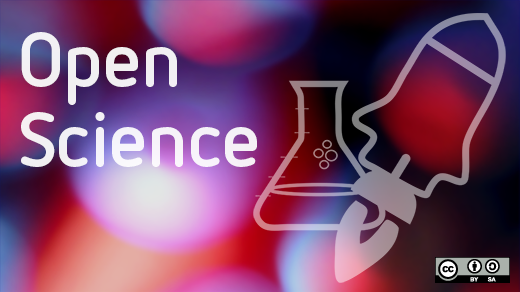When it comes to opening up your work there is, ironically, a bit of a secret. Here it is: being open—in open science, open source software, or any other open community—can be hard. Sometimes it can be harder than being closed. In an effort to attract more people to the cause, advocates of openness tend to tout its benefits.
Said benefits are bountiful: increased collaboration and dissemination of ideas, transparency leading to more frequent error checking, improved reproducibility, easier meta-analysis, and greater diversity in participation, just to name a few. But there are downsides, too. One of those is that it can be difficult to do your research openly. (Note here that I mean well and openly. Taking the full contents of your hard drive and dumping it on a server somewhere might be technically open, but it’s not much use to anyone.)
How is it hard to open up your work? And why? Closed means privacy. In the privacy of my own home, I seldom brush my hair. Sometimes I spend all day in my pajamas. I leave my dirty dishes on the table and eat ice cream straight out of the tub. But when I have visitors, or when I’m going out, I make sure to clean up. In the privacy of a closed access project, you might take shortcuts. You might recruit participants from your own 101 class, or process your data without carefully documenting which steps you took. You’d never intentionally do something unethical, but you might get sloppy. Humans are social animals. We try to be more perfect for each other than we do for ourselves.
This makes openness better, but it also makes it harder.
Two heads need more explanation than one
As I mentioned above, taking all your work and throwing it online without organization or documentation is not very helpful. There’s a difference between access and accessibility. To create a truly open project, you need to be willing to explain your research to those trying to understand it. There are numerous routes towards sharing your work, and the most open projects take more than one. You can create stellar documentation of your project. You can point people towards background material, finding good explanations of the way your research methodology was developed or the math behind your data analysis or how the code that runs your stimulus presentation works. You can design tutorials or trainings for people who want to run your study. You can encourage people to ask questions about the project, and reply publicly. You can make sure to do all the above for people at all levels—laypeople, students, and participants as well as colleagues. Even closed science is usually collaborative, so hopefully your project is decently well documented. But making it accessible to everyone is a project in itself.
New ideas and tools need to be learned
As long as closed is the default, we’ll need to learn new skills and tools in the process of becoming open, such as version control, format conversion, and database management. These skills aren’t unique to working openly. And if you have a good network of friends and colleagues, you can lean on them to supplement your own expertise. But the fact remains that "going open" isn’t as easy as flipping a switch. Unless you’re already well-connected and well-informed, you’ll have a lot to learn.
People can be exhausting
Making your work open often means dealing with other people—and not always the people you want to deal with. There are the people who mean well, but end up confusing, misleading, or offending you. There are the people who don’t mean well at all. There are the discussions that go off in unproductive directions, the conversations that turn into conflicts, the promises that get forgotten. Other people are both a joy and a frustration, in many areas of life beyond open science. But the nature of openness assures you’ll get your fair share. This is especially true of open science projects that are explicitly trying to build community. It can be all too easy to overlook this emotional labor, but it’s work—hard work, at that.
There are no guarantees
For all the effort you put into opening up your research, you may find no one else is willing to engage with it. There are plenty of open source software projects with no forks or new contributors, open science articles that are seldom downloaded or science wikis that remain mostly empty, and open government tools or datasets that no one uses. Open access may increase impact on the whole, but there are no promises for any particular project. It’s a sobering prospect to someone considering opening up their research.
How can we make open science easier?
We can advocate for open science while acknowledging the barriers to achieving it. And we can do our best to lower those barriers:
Forgive imperfections. We need to create an environment where mistakes are routine and failures are expected—only then will researchers feel comfortable exposing their work to widespread review. That’s a tall order in the cutthroat world of academia, but we can begin with our own roles as teachers, mentors, reviewers, and internet commentators. Be a role model: encourage others to review your work and point out your mistakes.
Share your skills as well as your research. Talk about your experiences opening up your research with colleagues. Host lab meetings, department events, and conference panels to discuss the practical difficulties. If a training, website, or individual helped you understand some skill or concept, recommend widely. Talking about the individual steps will help the journey seem less intimidating, and it will give others a map for how to get there.
Recognize the hard work of others with words and, if you can, financial support. Organization, documentation, mentorship, community management. These are areas that often get overlooked when it comes to celebrating scientific achievement—and allocating funding. Yet many open science projects would fail without leadership in these areas. Contribute what you can and support others who take on these roles.
Collaborate. Open source advocates have been creating tools to help share the work involved in opening research—there’s Software Carpentry, the Open Science Framework, Sage Bionetworks, and Research Compendia, just to name a few. But beyond sharing tools, we can share time and resources. Not every researcher will have the skillset, experience, or personality to quickly and easily open up their work. Sharing efforts across labs, departments and even schools can lighten the load. So can open science specialists, if we create a scientific culture where these specialists are trained, utilized and valued.
We can and should demand open scientific practices from our colleagues and our institutions. But we can also provide guidelines, tools, resources, and sympathy. Open science is hard. Let’s not make it any harder.
Originally posted on the Open Science Collaboration blog. Reposted under Creative Commons.
View the complete collection of stories for Open Science Week.







Comments are closed.